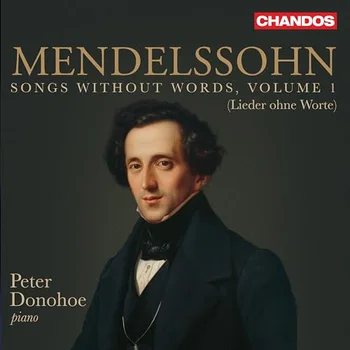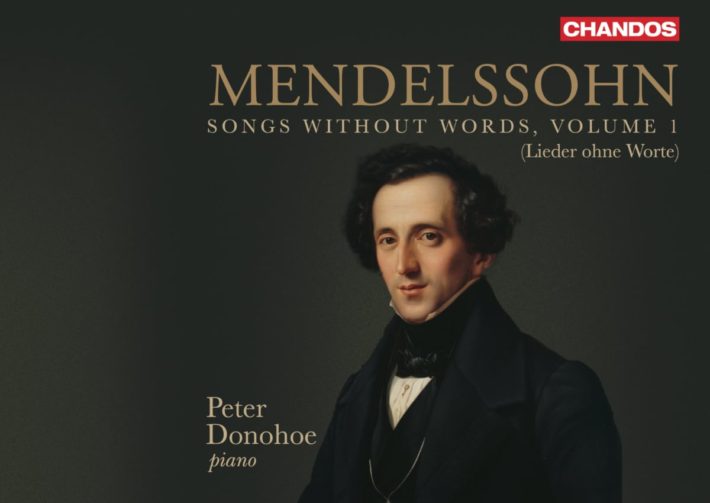Written over the course of 16 years, The Lieder ohne Worte were published in eight volumes, each with six short character pieces (48 works in all). All 48 pieces show Mendelssohn‘s astonishing melodic fluency and symmetry of form. This is the first release in a projected series that will feature the eight books of Lieder ohne Worte. In the last decade Ronald Brautigam recorded these eight volumes on two BIS CDs, and Hyperion has just released (literally on the same day as this Donohoe album) Howard Shelley’s final recording of the composer’s complete solo piano music, which includes books 7 and 8.

This new recording begins with the two youthful works, opus 14 “Rondo capriccioso” and opus 16 “Trois Fantaisies ou Caprices.” The Rondo’s opening soft Andante clearly relates it to the other repertoire on the album, the right-hand singing a gorgeously lyrical melody over gentle left-hand accompaniment. It then segues into an Allegro filled with melismatic, shimmering passagework that requires a light touch to fully uncover its elfin spirit. Donohoe’s refined eloquence ensures the Andante’s melody truly sings, and that florid passagework is dispatched with clarity and evenness of tone. Rubato is tasteful, never overdone, and he exhibits masterful control of dynamics. Donohoe’s touch produces diaphanous textures and a wide mixture of coloration that is consistently beautiful. In short, here is playing of extraordinary poise and grace.
These qualities are heard throughout the album, though the same can be said – and expected – from a host of accomplished pianists. But Donohoe’s poetic sensitivity, which draws out the genuine emotion from these short character pieces is perhaps more uncommon. It is fascinating to compare the performances of these three different players: Brautigam’s readings, played on a modern copy of an 1830 Pleyel, tend to be the fastest. They have a youthful vibrancy and infectious energy that create a clear connection between Mendelssohn and composers of the previous generation. Donohoe proves to be the most reflective. His interpretations are moodier and more emotional, the use of more generous rubato and a wider array of tempi making his performances more overtly Romantic in conception.
Shelley stakes out the middle ground between these two: his faster tempos sometimes equal Brautigam’s speediest readings, but he never plays slower movements as slow as Donohoe. One need look no further than the opening song of Book 1, which Brautigam plays in 2’41,” Shelley takes 3’27,” and Donohoe takes 3’56”. Brautigam’s performance has impetuous, searching energy, whereas Donohoe’s performance has a wistful, almost forlorn quality. And Shelley, embracing a freer rubato, is more emotionally ambiguous. Each reading is convincing, though each conveys a very different mood and emotion.
I am frustrated by the program’s layout: as a collector, having at least one complete book on each CD in the series (as Shelley has done) would be more satisfying. Instead, here we have selections from every book except the seventh. Perhaps Donohoe is trying to create greater variety, but Mendelssohn has already built that each volume. A small complaint, though one that pushes my choice more towards Shelley.
The recording, made in Suffolk’s Potton Hall in May 2021 is excellent, rivaling the Super Audio sound BIS provides Brautigam in his recording. The clarity and warmth of the Steinway Model D Concert Grand is beautifully caught. An unexpected surprise was the graphical error in the cover and booklet that appears to have cut one of the composer’s cheeks, which probably escaped Chandos. But Bayan Northcott’s liner notes are exceptionally informative and there is also an introductory note by Donohoe that explains just how much this music means to him, although one already knows that from his playing. This is an auspicious start to the series, and I look forward to the next release.
Recommended Comparisons:
Shelley | Brautigam | Barenboim | Schiff
Mendelssohn – Songs Without Words, Volume 1
Peter Donohoe – Piano
Chandos, CD 20252



















